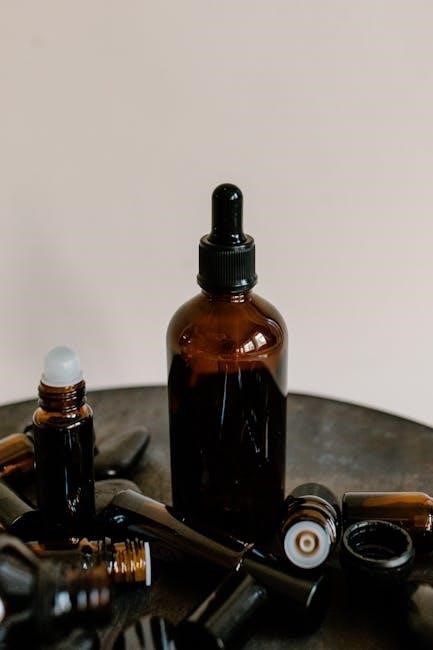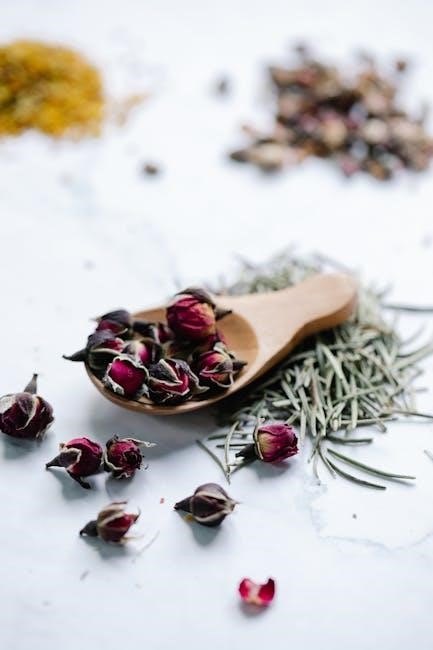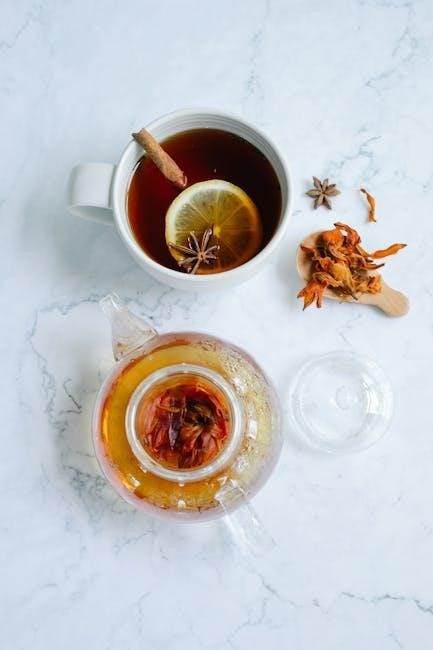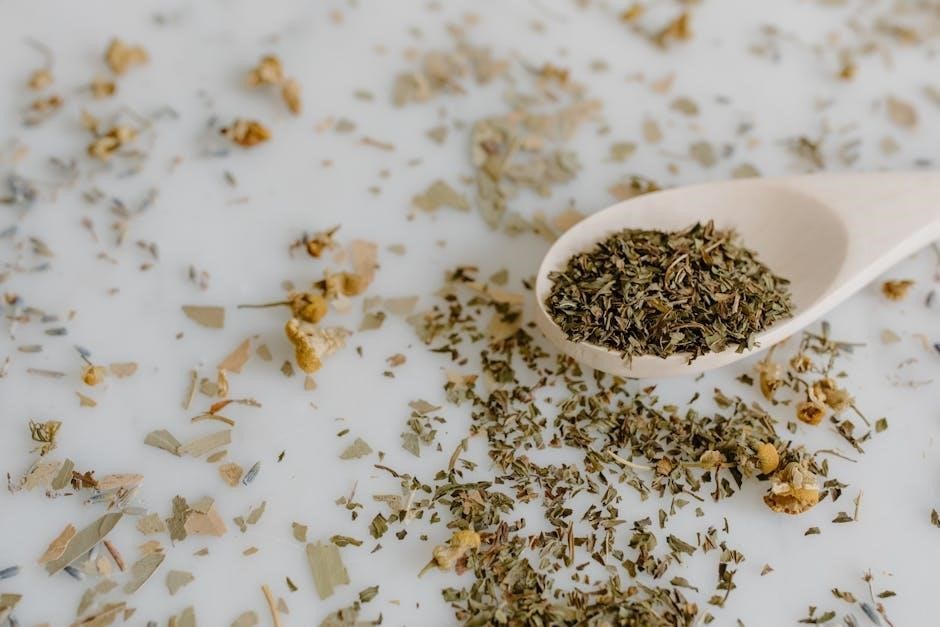
The Bible highlights herbs as natural remedies‚ emphasizing their role in physical and spiritual healing. Plants like aloe vera‚ myrrh‚ and hyssop are referenced for their therapeutic properties‚ showcasing God’s provision for human well-being and holistic wellness.
The Biblical Basis for Herbal Healing
The Bible establishes a clear foundation for herbal healing‚ with Psalm 104:14 emphasizing God’s provision of herbs for humanity’s benefit and well-being.

2.1. Psalm 104:14 ⎻ God’s Provision of Herbs
Psalm 104:14 underscores God’s provision of herbs for humanity‚ highlighting their role in sustaining life and promoting health. This verse reflects His divine care and wisdom in creation‚ providing natural remedies for human well-being and demonstrating His love through the abundance of the earth. Herbs are portrayed as a gift‚ intended to serve both physical and spiritual needs‚ aligning with biblical teachings on stewardship and holistic wellness. This passage is a cornerstone for understanding the biblical basis of herbal healing‚ encouraging believers to appreciate and utilize God’s natural provisions responsibly.
2.2. Other Key Scriptures on Herbs and Healing
The Bible contains numerous references to herbs and their healing properties‚ beyond Psalm 104:14. Exodus 12:8 mentions the use of bitter herbs during Passover‚ symbolizing the bitterness of slavery and the need for spiritual cleansing. John 19:29 highlights hyssop‚ used to offer Jesus vinegar during His crucifixion‚ while Matthew 2:11 notes the gift of myrrh‚ a resin with medicinal qualities. These verses illustrate the integration of herbs in biblical rituals and healing practices‚ reflecting their cultural and spiritual significance. They emphasize God’s provision of natural remedies‚ encouraging faith and trust in His creation for holistic well-being.

Significant Herbs Mentioned in the Bible

Herbs like frankincense‚ galbanum‚ and mandrake are noted in the Bible for their medicinal and symbolic roles‚ reflecting their cultural and spiritual significance in ancient traditions and rituals‚ highlighting their importance beyond healing.

3.1. Aloes (John 19:39)
Aloes are prominently mentioned in John 19:39‚ where Nicodemus brought a mixture of myrrh and aloes to anoint Jesus’ body after His crucifixion. This act highlights the plant’s significance in ancient burial practices and its soothing properties. Aloe vera‚ in particular‚ has been used for centuries for its healing qualities‚ including skin soothing and anti-inflammatory effects. In the Bible‚ aloes symbolize purification and healing‚ reflecting their role in both physical and spiritual contexts. Their inclusion in sacred rituals underscores their value as a natural remedy‚ bridging practical use with deep symbolic meaning in biblical traditions and culture.
3.2. Hyssop (Exodus 12:8‚ John 19:29)
Hyssop is a herb deeply rooted in biblical history‚ featured in Exodus 12:8 and John 19:29. In Exodus‚ it was used by the Israelites to mark their doorposts with the blood of the Passover lamb‚ symbolizing protection and purification. During Jesus’ crucifixion‚ a sponge soaked in vinegar was offered to Him on a hyssop branch‚ fulfilling a prophetic act. Hyssop’s significance extends beyond ritual; it was valued for its cleansing and medicinal properties‚ used to purify homes and people. This dual role in both spiritual and physical purification highlights its importance in ancient traditions‚ making it a symbol of redemption and healing in biblical narratives and practices.
3.3. Myrrh (Matthew 2:11‚ John 19:39)
Myrrh‚ a resin extracted from the Commiphora tree‚ holds significant value in the Bible‚ appearing in Matthew 2:11 and John 19:39. The Magi presented it to Jesus as a gift‚ symbolizing His future suffering and death. Mixed with aloes‚ myrrh was used to anoint Jesus’ body after His crucifixion‚ reflecting its use in ancient burial practices. Beyond its symbolic role‚ myrrh was renowned for its medicinal properties‚ including anti-inflammatory and antimicrobial effects. It was used to heal wounds‚ reduce pain‚ and purify the body. Myrrh’s dual role in biblical accounts underscores its importance as both a spiritual offering and a natural remedy‚ bridging the gap between religious rituals and practical healing applications.
Spiritual and Cultural Significance of Biblical Herbs
Biblical herbs hold deep spiritual and cultural meaning‚ often used in rituals for purification‚ healing‚ and symbolic acts. They connect faith‚ tradition‚ and natural wellness practices‚ reflecting divine provision and care.
4.1. Spiritual Healing and Symbolism
Biblical herbs are deeply intertwined with spiritual healing and symbolism‚ reflecting God’s divine plan for humanity’s well-being. Herbs like hyssop‚ mentioned in Psalm 51:7‚ symbolize purification and cleansing from sin. Similarly‚ frankincense and myrrh‚ gifts to Jesus‚ represent prayer and sacrifice. These plants were often used in rituals to cleanse both body and spirit‚ emphasizing the connection between physical and spiritual health. Their use in anointing and worship underscores their sacred role in biblical traditions‚ bridging the natural and supernatural realms. This symbolism highlights God’s provision for holistic healing‚ addressing not just physical ailments but also emotional and spiritual needs.
4.2. Cultural and Traditional Uses
Biblical herbs have deep cultural and traditional significance‚ often used in rituals‚ ceremonies‚ and daily life. Aloe‚ for instance‚ was valued for its embalming properties and perfume‚ while myrrh was used for anointing and purification. Hyssop was integral to Jewish rituals‚ such as the Passover‚ symbolizing cleansing and renewal. These herbs were not only for healing but also held communal and symbolic meanings‚ reflecting a connection to faith and heritage. Their use in traditional practices highlights the intersection of culture‚ spirituality‚ and natural remedies‚ showcasing their enduring role in biblical societies and beyond.
Health Benefits of Biblical Herbs
Biblical herbs‚ such as aloe and myrrh‚ offer natural remedies for skin conditions‚ pain relief‚ and infections‚ promoting physical and mental well-being through holistic healing.
5.1. Physical Health Benefits
Biblical herbs have been praised for their physical health benefits‚ offering natural remedies for various ailments. Aloe vera‚ for instance‚ is renowned for its soothing properties‚ aiding in skin healing and reducing inflammation. Myrrh‚ another biblical herb‚ has been used to clean wounds‚ reduce pain‚ and combat infections. Hyssop is noted for its respiratory benefits‚ easing congestion and coughs. These plants‚ as mentioned in scriptures‚ provide holistic approaches to physical well-being‚ aligning with ancient wisdom that emphasizes natural healing. By incorporating these herbs‚ individuals can harness their therapeutic potential to support overall health and vitality‚ reflecting the Bible’s emphasis on God’s provision for bodily care and restoration.
5.2. Emotional and Mental Well-being
Biblical herbs also play a significant role in promoting emotional and mental well-being. Certain plants‚ such as frankincense and myrrh‚ have been used in ancient rituals to create a calming environment‚ fostering peace and spiritual connection. Hyssop‚ mentioned in Psalm 51‚ symbolizes purification and cleansing of the mind and spirit. The aromatic properties of these herbs can uplift the senses‚ reducing stress and anxiety. Incorporating these plants into daily life‚ whether through aromatherapy or meditation‚ can enhance emotional balance and mental clarity. The Bible’s emphasis on holistic healing extends to the mind‚ offering natural solutions to modern psychological challenges‚ thereby nurturing both body and soul through God’s divine provision.

Modern Applications of Biblical Herbs
Biblical herbs like aloe vera‚ myrrh‚ and frankincense are widely used today in herbal remedies‚ skincare‚ and aromatherapy‚ promoting natural wellness and spiritual balance in modern lifestyles.
6.1. Herbal Remedies in Contemporary Medicine
Biblical herbs like frankincense‚ myrrh‚ and hyssop are increasingly used in modern medicine for their anti-inflammatory and antimicrobial properties. These herbs are incorporated into pharmaceutical products‚ ointments‚ and supplements‚ offering natural alternatives for pain relief and wound healing. Aloe vera‚ mentioned in John 19:39‚ is widely used in skincare products for its soothing effects. Similarly‚ research has validated the antibacterial benefits of hyssop‚ making it a popular ingredient in natural remedies. Modern herbalists and scientists are rediscovering the healing potential of these ancient plants‚ blending traditional knowledge with contemporary medical practices to promote holistic wellness and preventive care.
6.2. Cosmetics and Skincare
Biblical herbs like aloe vera‚ myrrh‚ and frankincense are widely used in modern cosmetics and skincare products. Aloe vera‚ mentioned in John 19:39‚ is renowned for its moisturizing and anti-inflammatory properties‚ making it a key ingredient in creams and gels. Myrrh‚ referenced in Matthew 2:11‚ is valued for its ability to soothe skin irritations and reduce inflammation. Frankincense‚ also found in Matthew 2:11‚ is prized for its anti-aging benefits and ability to reduce skin imperfections. These herbs‚ alongside others like rosemary and lavender‚ are incorporated into luxury skincare products‚ offering natural solutions for various skin concerns. Their timeless popularity reflects their efficacy in promoting healthy‚ radiant skin.

Safety and Precautions in Using Herbal Remedies

Consult healthcare professionals before using herbal remedies‚ especially for allergies‚ pregnancies‚ or existing medical conditions. Ensure proper dosage and be aware of potential interactions with medications.
7.1. Guidelines for Safe Usage
When using herbal remedies‚ consult healthcare professionals‚ especially for allergies‚ pregnancies‚ or medical conditions. Follow recommended dosages and be aware of drug interactions. Proper identification and preparation of herbs are crucial to avoid adverse effects. Start with small amounts to assess tolerance. Document reactions and adjust usage accordingly. Keep herbs out of children’s reach and store them properly. Combine herbs with prayer and faith for holistic healing‚ as emphasized in biblical practices. Ensure herbs are organic and free from contaminants for optimal safety. Modern healthcare integration requires expert guidance to maximize benefits and minimize risks. Always prioritize caution and informed decision-making when incorporating herbal remedies into your wellness routine.
The Bible offers profound insights into the use of herbs for healing‚ blending physical remedies with spiritual faith. Herbs like aloe‚ hyssop‚ and myrrh are highlighted for their medicinal and symbolic significance. By incorporating these plants into daily life‚ individuals can embrace natural wellness while honoring biblical traditions. Modern applications of these herbs in medicine and skincare demonstrate their timeless value. However‚ safe usage requires caution‚ expert guidance‚ and mindfulness of potential interactions. As the Bible teaches‚ herbs are a gift from God‚ intended to promote holistic health. By respecting their power and aligning their use with faith‚ we can experience the full benefits of these ancient remedies in our contemporary world.
